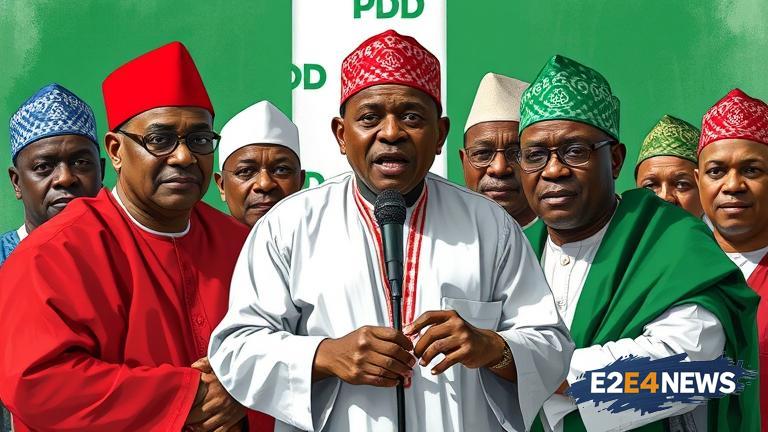The PDP, one of Nigeria’s major political parties, is currently embroiled in a crisis that threatens to tear it apart. At the center of the crisis are some governors who are refusing to back down on their demands, despite efforts by the party’s leadership to resolve the issues. The governors, who are from different states, are unhappy with the party’s decision-making process and feel that their interests are not being represented. They are demanding greater autonomy and a more significant role in the party’s decision-making process. The crisis has been brewing for some time, but it came to a head recently when the governors refused to attend a meeting called by the party’s leadership. The meeting was intended to resolve the issues and find a way forward, but the governors’ absence was seen as a sign of their determination to press their demands. The party’s leadership has been trying to find a way to resolve the crisis, but so far, no solution has been found. The governors’ rebellion has been described as a threat to the party’s unity and chances in the upcoming elections. The PDP is already facing a tough challenge from the ruling All Progressives Congress (APC), and the crisis has made its task even more difficult. The party’s national chairman has been holding meetings with the governors and other stakeholders in an effort to find a solution, but the outcome is still uncertain. The crisis has also exposed the deep-seated divisions within the party, with some members accusing the governors of being selfish and others blaming the party’s leadership for not doing enough to address their concerns. The PDP has a long history of internal conflicts, and this crisis is just the latest example. The party has been trying to reform itself and become more democratic, but the process has been slow and painful. The governors’ rebellion has highlighted the need for the party to become more inclusive and responsive to the needs of its members. The party’s leadership has promised to do more to address the concerns of the governors and other stakeholders, but it remains to be seen whether this will be enough to resolve the crisis. The PDP is not the only party facing internal conflicts, but its crisis has significant implications for the country’s political landscape. The party has a large following and plays a crucial role in the country’s opposition. If the crisis is not resolved, it could have far-reaching consequences for the party and the country as a whole. The international community is watching the situation closely, and there are concerns that the crisis could undermine the country’s democratic process. The PDP’s crisis is also having an impact on the country’s economy, with some investors expressing concerns about the stability of the political system. The party’s leadership has promised to do everything possible to resolve the crisis and ensure that the party emerges stronger and more united. However, the outcome is still uncertain, and the party’s future hangs in the balance. The crisis has also raised questions about the role of governors in the party and the need for greater autonomy and representation. The PDP’s constitution gives the governors a significant amount of power, but some members feel that this power is being abused. The party’s leadership has promised to review the constitution and make changes to ensure that the party becomes more democratic and inclusive. The crisis has also highlighted the need for the party to become more transparent and accountable. The party’s finances have been a subject of controversy, with some members accusing the leadership of mismanaging funds. The party’s leadership has promised to be more transparent and accountable, but this will require significant changes to the party’s culture and practices.
